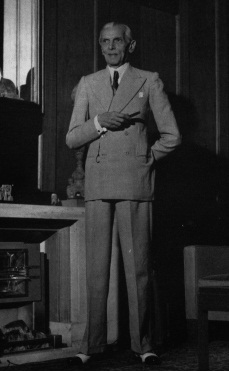According to famous historian Stanley Wolpert, "Few individuals significantly
alter the course of history. Fewer still modify the map of the world. Hardly
anyone can be credited with creating a nation-state. Mohammad Ali Jinnah did
all three." What Mohandas K. Gandhi was to India, Mohammed Ali Jinnah was to
Pakistan--the architect of its statehood. In Pakistan, Jinnah is portrayed as
an embodiment of virtues and given the title "Quaid-e-Azam" or The Great
Leader. However, in India, Jinnah is perceived as a villain who split the
motherland to create a baseless new country--Pakistan. Let us scrutinize if
that is what Jinnah was, an arrogant and stubborn politician without a vision?
Jinnah's influence has induced a sense of detestation in me for the
misrepresentation of Pakistan's ideology. Through Jinnah's concept of
Pakistan's political identity, I have come to realize the utter pointlessness
of the Indo-Pak rivalry. For fifty-three years, this rivalry has been a mutual
struggle for the two countries to deny each other's existence. Had I not been
influenced by Jinnah, never would I have comprehended the reason for
Pakistan's existence. Despite my patriotism, I feel ashamed to declare that
much of the historical discourse and social analysis in Pakistan today is
based on negative methodologies which seek to justify Pakistan's failures and
shortcomings by pointing out similar problems that also exist in neighboring
India. Instead of focusing their academic lens on the Pakistani situation- be
the view positive or negative- and analyzing what is seen within their nation,
the Pakistani politicians repeatedly use the tactic of dismissing problems in
Pakistan by discussions of parallel problems in India. Within this paradigm,
Pakistan's national ideology is now defined by placing the country's problems
in a less negative light in comparison to India's problems. This could be an
example of self-justification, but more accurately results in self-negation. Unfortunately, this theory has been consolidated over the course of time.
Did Jinnah envision such a Pakistan? In my opinion, clearly not.
However, why has Jinnah's vision of a Pakistan that would stand out in the
whole world been lost by us? Why has the nation lost the ideology for which
her father devoted his life? Baseless propaganda by our politicians--the so
called guardians of national interests--has distorted the ideology of Pakistan
for its citizens. After Jinnah's death, a common Pakistani was led to believe
that all national resources and capabilities needed to be invested in proving
supremacy over the neighboring rival. Presently, such is the level of
political ignorance in Pakistani public that India is blamed for every
shortcoming. If the monsoon rains arrive late or a cricket match is lost,
people see an Indian conspiracy.
I want Pakistanis to ask themselves if Jinnah desired his nation to
adopt an eternally biased position with India. How can they
explain the fact that in his will, he left provisions for his
estates in Bombay, Delhi and Aligarh, knowing well that they would
be in independent India. How do they explain that in 1948 with the Cold War
emerging and two blocs forming, Jinnah proposed a joint defense pact for India
and Pakistan? Consequently, Jinnah's farsighted approach towards regional
co-operation has molded my political perspective. While I do exhort the
importance of national pride and unique identity of Pakistan, I disagree with
the current Pakistani policy of divergence from India. For instance, according
to my political thought that has been shaped by Jinnah's ideology for
Pakistan, the nuclear tests that Pakistan conducted simply to follow suit with
India are detestable. If Pakistan were to adopt Jinnah's policy towards India,
she would not have to bear the economic strain of a colossal military.
Furthermore, Jinnah's influence on me has created resentment for
the Hindu-Muslim hatred that is promoted by political leaders in
India and Pakistan. On both sides of the border, politicians
play politics all the time with religious beliefs. Fundamentalist
parties, such as Jamat-e-Islami in Pakistan, promote hatred against
India on a religious basis and claim this to be Jinnah's reason to
create Pakistan. Millions of blindfolded citizens support such
parties, which also incite riots against religious minorities within
Pakistan. I think that such demeanor of Jinnah's ideology is disgraceful.
During religious riots at the creation of Pakistan, Jinnah said to his
countrymen, "I would rather be protector general of the Hindu minority in
Pakistan than governor general of Pakistan. You will find that in the course
of time, Hindus would cease to be Hindus and Muslims would cease to be
Muslims, not in the religious sense because that is the personal faith of each
individual, but in the political sense as citizens of the state." Such
historical evidence has convinced me of Jinnah's proposals that Pakistan
should declare itself a secular state, as envisioned by the founder. Only then
will we be able to free ourselves from the clutches of ethnic and religious
hatred, and achieve national prosperity. As a modern Muslim living in South
Asia, I find Jinnah to be a great example of a person who was able to balance
tradition and modernity; who was able to balance Islam and live with other
religions. That in fact is the essence of society and civilization.
Consequently, Pakistan needs to liberalize its religious affiliation, and
bridge its gap with the western world by abolishing the image of a
fundamentalist country, non-progressive nation.
In conclusion, Jinnah provides the meaning and objective of my dream
for Pakistan. Given the mental enlightenment that I have discovered
through Jinnah, I do seek to introduce the above mentioned progressive
political ideas to a common Pakistani. That is the relevance of Jinnah to my
present beliefs and my future plans.
© 2001 M. Jehanzeb Noor Used with permission.
Return to Mr. Charon's "Famous People of India"

